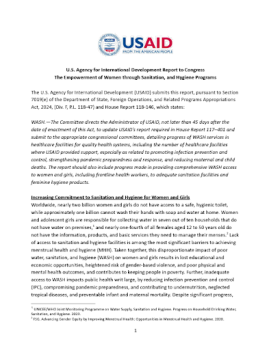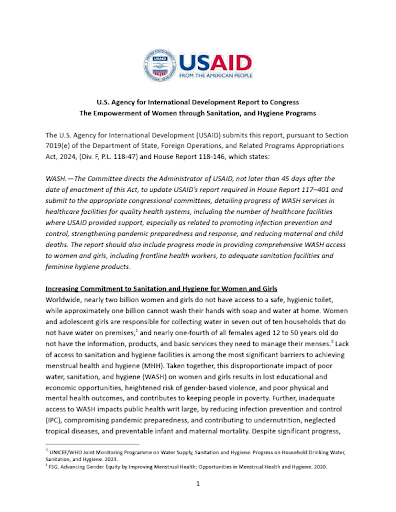FY 2024
The Empowerment of Women through Sanitation, and Hygiene Programs, FY 2024 report covers the increasing commitment to sanitation and hygiene for women and girls, leveraging the private sector to expand access to menstrual hygiene products, changing norms for improved menstrual wellness, improving girls’ education about sanitation and hygiene, supporting women and girls with WASH in emergencies, and WASH in healthcare facilities.
The U.S. Agency for International Development (USAID) submits this report, pursuant to Section 7019(e) of the Department of State, Foreign Operations, and Related Programs Appropriations Act, 2024, (Div. F, P.L. 118-47) and House Report 118-146, which states:
“The Committee directs the Administrator of USAID, not later than 45 days after the date of enactment of this Act, to update USAID’s report required in House Report 117–401 and submit to the appropriate congressional committees, detailing progress of WASH services in healthcare facilities for quality health systems, including the number of healthcare facilities where USAID provided support, especially as related to promoting infection prevention and control, strengthening pandemic preparedness and response, and reducing maternal and child deaths. The report should also include progress made in providing comprehensive WASH access to women and girls, including frontline health workers, to adequate sanitation facilities and feminine hygiene products.”
Previous year’s reports:
FY 2022
This report provides USAID Missions and partners with recommendations on how to contribute to equitable MHH outcomes in alignment with existing sector-based mandates, such as adolescent health, education, women’s economic empowerment, and safe drinking water, sanitation and hygiene (WASH).
FY 2021
This report covers the global context for sanitation and hygiene for women and girls, improved understanding of menstrual health and hygiene, economic empowerment through sanitation and hygiene, expanding access to menstrual hygiene products, supporting women in emergencies, and institutionalizing investments in sanitation and hygiene for female empowerment.


